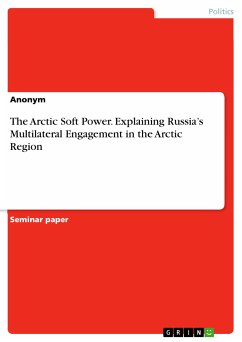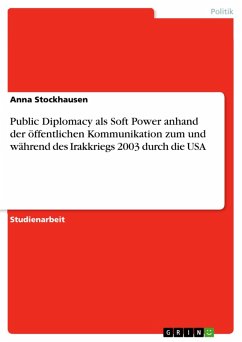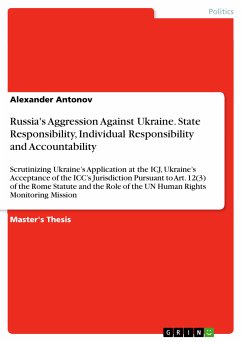Seminar paper from the year 2018 in the subject Politics - Region: Russia, grade: 6.0/6.0, University of Zurich (Departement für Politikwissenschaft), course: Russian Foreign Policy and Security Doctrine since 1991, language: English, abstract: When the Russian flag was placed on the ocean floor at the North Pole in summer of 2007, the Western press sought public attention with headlines such as "Arctic Meltdown" or "Arctic Land Grab". Only recently, Kremlin's announcement to strengthen its military foothold in the far north was answered by the Western media in similar fashion, stating that "Russia prepares for Arctic War" or "Start of a very cold war". Even though Russia's activities in the Arctic vary considerably compared to its entanglement in the Ukraine, the media coverage suggests the same sense of antagonism, competition and crisis. Western commentators first of all tend to overlook that planting a national flag at targets difficult to reach is common among explorers as in the case of the Mount Everest, the South Pole or the Moon. Second of all, Russia has ratified the law of the sea convention which prescribes and establishes rules governing all uses of the oceans and their resources - a convention which was not ratified by the United States and several other countries. The point is not to criticize the Western media coverage or the absent ratification of the sea convention by the U.S., but to draw attention to a possible bias in order to impartially examine what kind of foreign policy Russia actually pursues in the High North.There is a broad consensus among the vast majority of academics and observers of Russia's Arctic policy, namely that Russia is pursuing an Arctic policy that mainly focuses on compromise, collaboration, and stability; therefore, Russia relies on soft power policies such as diplomacy, multilateral engagement and economic development. For many, this comes rather surprisingly, since the political leadership of President Putin is associated with a realist and revisionist foreign policy strategy that does not like to follow international rules. In this sense, this short paper aims to examine the question of what is motivating Russia to pursue soft power policy in the Arctic from different angles.
Dieser Download kann aus rechtlichen Gründen nur mit Rechnungsadresse in A, B, BG, CY, CZ, D, DK, EW, E, FIN, F, GR, HR, H, IRL, I, LT, L, LR, M, NL, PL, P, R, S, SLO, SK ausgeliefert werden.









